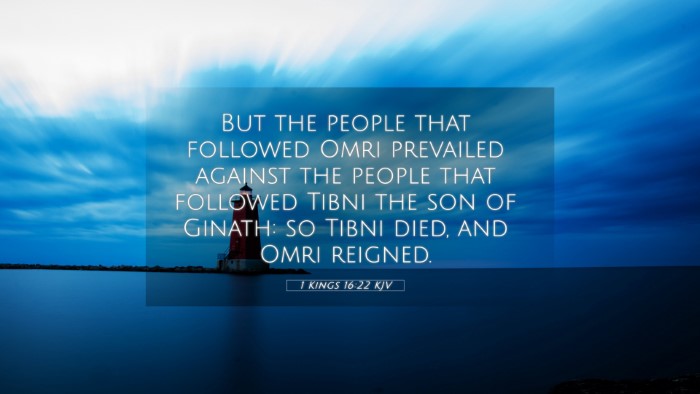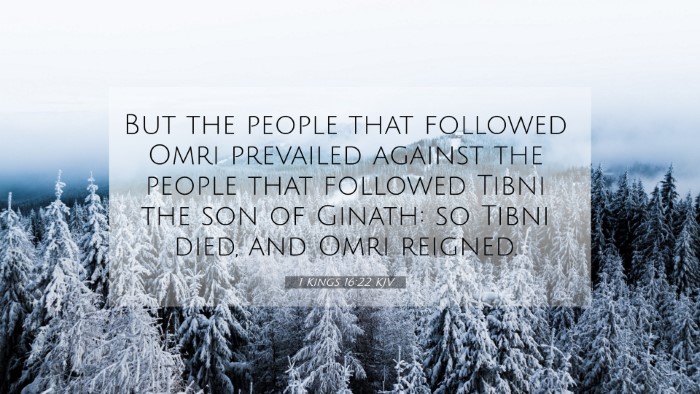Understanding 1 Kings 16:22
1 Kings 16:22 reads: "But the people that followed Omri prevailed against the people that followed Tibni the son of Ginath: so Tibni died, and the kingdom was established in the hand of Omri." This verse provides a significant moment in the history of Israel, marking the establishment of Omri's reign over the northern kingdom.
Summary of the Verse
In this passage, we witness a power struggle during a tumultuous time in Israel's history. Following the death of King Asa, two leaders emerged: Omri, a military commander, and Tibni, who also sought the throne. The verse indicates that a faction of the Israelites remained loyal to Tibni, but ultimately, Omri's supporters gained the upper hand.
Commentary Insights
- Matthew Henry:
Henry highlights the importance of Omri's military power and strategic alliances that secured his position. He notes that the conflict reflects the broader struggle for leadership in Israel, showcasing the often-fractured nature of governance during this period.
- Albert Barnes:
Barnes provides context around the significance of Omri's established kingdom. He emphasizes that Omri’s victory led to the establishment of a dynasty that would have lasting implications for Israel, influencing future rulers and the direction of the nation.
- Adam Clarke:
Clarke discusses Tibni's role and the division among the people. He notes that Tibni, despite losing, represented a legitimate claim to the throne, emphasizing the complexities of leadership and loyalty in Ancient Israel.
Thematic Connections
This verse connects to various themes within Scripture, including leadership, conflict, and the sovereignty of God in guiding the fate of nations.
Cross-References
The following Bible verses relate to 1 Kings 16:22, enhancing our understanding of the text and its implications:
- 1 Kings 11:26-28 – Discusses Omri's background and qualifications as a leader.
- 2 Chronicles 22:7 – Mentions Ahaziah, linking to the consequences of Omri's rule.
- Micah 6:16 – Addresses the consequences of the actions of Israel's leaders.
- 1 Kings 16:23-24 – Follows the establishment of Omri's reign, providing further context.
- 2 Kings 8:20 – Describes the state of Israel under Omri’s dynasty.
- Proverbs 20:28 – Speaks to the importance of righteousness in leadership.
- James 4:6 – Relates to God's opposition to the proud, applicable in the context of leadership struggles.
Understanding Leadership Through Scripture
The leadership dynamics presented in 1 Kings 16:22 invite a deeper exploration of biblical leadership. The conflict between Omri and Tibni symbolizes not just a political struggle but represents themes of loyalty, ambition, and divine providence.
Conclusion
Studying this verse in connection with other passages allows us to gain a holistic view of the themes of leadership and conflict within the scriptures. This comparative Bible verse analysis reveals the connections between biblical texts and invites further exploration of the implications of leadership within the church and beyond.


